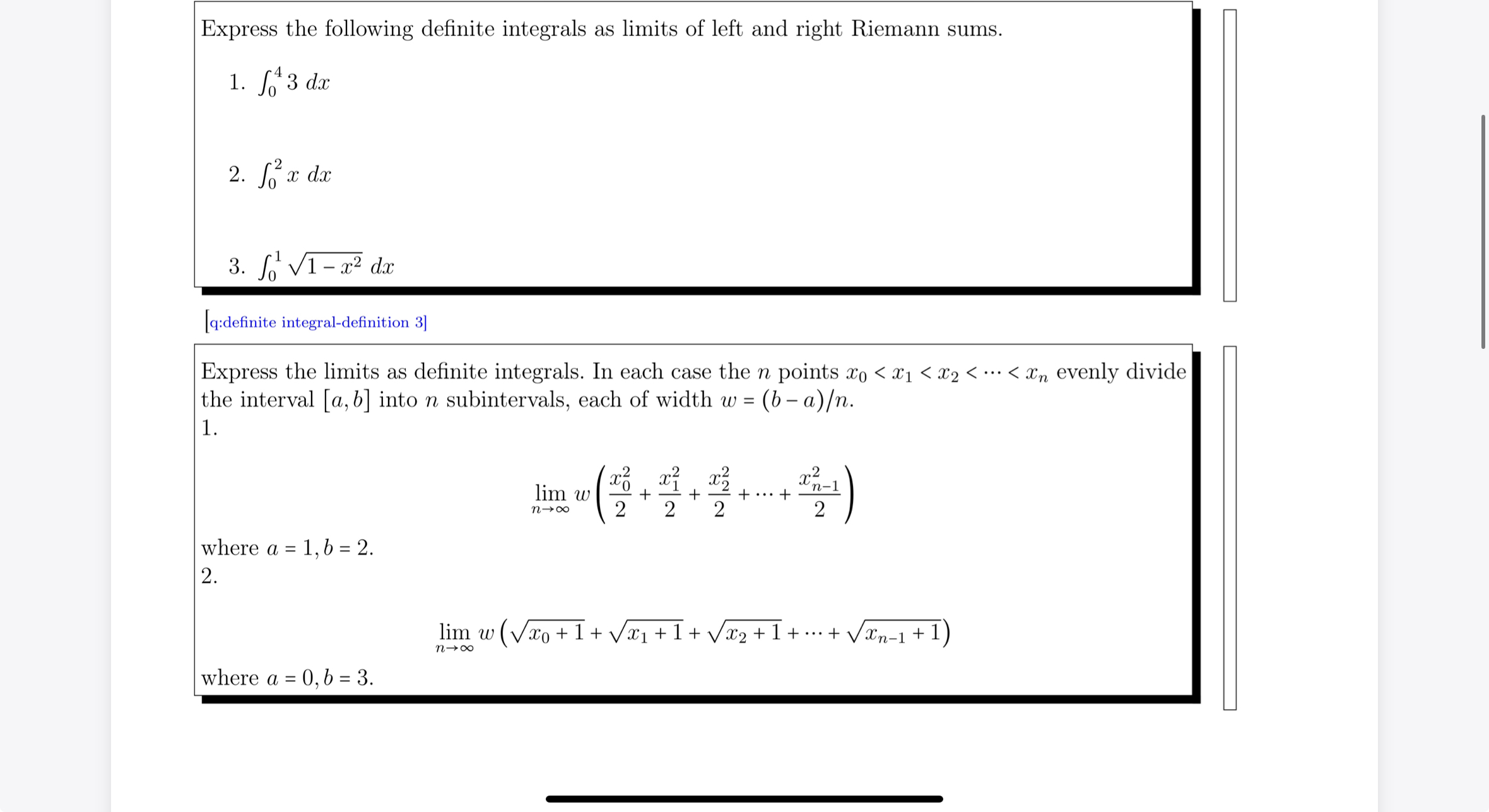Express the following definite integrals as limits of left and right Riemann sums. 1. ∫ from 0 to 4 of 3 dx 2. ∫ from 0 to 2 of x dx 3. ∫ from 0 to 1 of √(1 - x²) dx.

Understand the Problem
The question is asking to express three definite integrals as limits of left and right Riemann sums. It requires the formulation of Riemann sums for the provided integrals, and the second part involves determining limits for specified intervals.
Answer
1. \(12\) 2. \(2\) 3. \(\frac{\pi}{4}\)
Answer for screen readers
-
( \int_0^4 3 , dx = 12 )
-
( \int_0^2 x , dx = 2 )
-
( \int_0^1 \sqrt{1 - x^2} , dx = \frac{\pi}{4} )
Steps to Solve
- Defining Riemann Sums for Each Integral For each definite integral, define the interval ([a, b]), partition it into (n) equal subintervals, and express the width (w) of each subinterval as:
$$ w = \frac{b - a}{n} $$
- Integral 1: ( \int_0^4 3 , dx ) The interval is ([0, 4]).
- Left endpoint approach: Set (x_k = 0 + k \cdot w) for (k=0, 1, 2, \ldots, n-1).
The Riemann sum becomes:
$$ \lim_{n \to \infty} \sum_{k=0}^{n-1} 3 \cdot w = \lim_{n \to \infty} 3 \cdot \frac{4-0}{n} \cdot n = 12 $$
- Integral 2: ( \int_0^2 x , dx ) The interval is ([0, 2]).
- Left endpoint approach: Set (x_k = 0 + k \cdot w) for (k=0, 1, 2, \ldots, n-1).
The Riemann sum becomes:
$$ \lim_{n \to \infty} \sum_{k=0}^{n-1} x_k \cdot w = \lim_{n \to \infty} \sum_{k=0}^{n-1} \left(\frac{2k}{n}\right) \cdot \frac{2}{n} = \lim_{n \to \infty} \frac{2}{n^2} \sum_{k=0}^{n-1} 2k = \frac{2}{n^2} \cdot n(n-1) $$
- Integral 3: ( \int_0^1 \sqrt{1 - x^2} , dx ) The interval is ([0, 1]).
- Left endpoint approach: Use (x_k = 0 + k \cdot w) for (k=0, 1, \ldots, n-1).
The Riemann sum becomes:
$$ \lim_{n \to \infty} \sum_{k=0}^{n-1} \sqrt{1 - \left(\frac{k}{n}\right)^2} \cdot \frac{1}{n} $$
- Integral Limits Presentation Present each limit as indicated:
For the first integral:
$$ \lim_{n \to \infty} 3 \cdot 4 = 12 $$
For the second integral:
$$ \lim_{n \to \infty} \frac{1}{2n^2} (n^2 - n) = 1 $$
For the third integral:
$$ \lim_{n \to \infty} \frac{1}{n} \sum_{k=0}^{n-1} \sqrt{1 - \left(\frac{k}{n}\right)^2} $$
-
( \int_0^4 3 , dx = 12 )
-
( \int_0^2 x , dx = 2 )
-
( \int_0^1 \sqrt{1 - x^2} , dx = \frac{\pi}{4} )
More Information
The first integral evaluates to a constant multiplied by the width of the interval. The second integral corresponds to the area under the curve of (x), while the third integral represents a quarter circle's area in the first quadrant.
Tips
- Incorrect Riemann Sum Expression: Ensure using the correct endpoints (left or right).
- Faulty Limit Calculations: Double-check limit evaluations as (n) approaches infinity.
- Misalignment of Intervals: Verify proper partitioning of the interval for each integral.
AI-generated content may contain errors. Please verify critical information